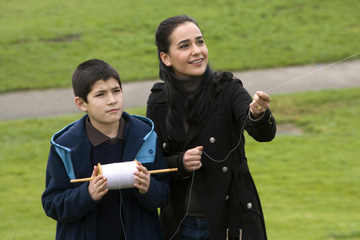The Kite Runner
Khalid Abdalla, Homayoun Ershadi, Zekeria Ebrahimi, and Ahmad Khan Mahmidzada star in a film written by David Benioff and directed by Marc Forster.

By now, many are probably familiar with the controversy that delayed the release of The Kite Runner, the screen adaptation of Khaled Hosseini’s blockbuster 2003 novel of friendship, betrayal, and redemption set against the backdrop of the Soviet invasion and subsequent Taliban takeover of Afghanistan. Extremist elements in Afghanistan had threatened The Kite Runner‘s two young leads for participating in the film, which (discreetly) depicts the rape of a child. After taking measures to ensure the youngsters’ safety, the filmmakers forged ahead – and rightly so. The rape is a turning point in the relationship between the two boys at the center of the story: Amir (Zekeria Ebrahimi), the son of a wealthy Kabul businessman, and Hassan (Ahmad Khan Mahmidzada), a servant in Amir’s household who is also Amir’s only friend. It is doubly unfortunate, then, that the filmmakers retained this key plot point, but omitted other elements that undercut the emotional resonance of the film.
The Kite Runner is charming and visually rich in its portrayal of Amir and Hassan as they grow up together in a Kabul that now exists only in our imaginations: making minor mischief, watching American movies, and – of course – flying kites. Director Marc Forster, who has experience eliciting strong performances from youthful actors (namely, Freddie Highmore in Finding Neverland), succeeds again with the child actors who portray Amir and Hassan. But the movie merely hints at Amir’s longing for his widowed father’s affection and approval – and his jealousy of his father’s obvious fondness for Hassan – making his ultimate betrayal of Hassan seem more like childish caprice than the malevolent, life-altering event it is in the book.
Similarly, when the film shifts in time and place to the U.S. – where Amir and his father flee after chaos seizes their native land – the now-grown Amir (Khalid Abdalla) doesn’t seem particularly haunted by the memory of his youthful transgression. When Rahim Khan, an old friend of Amir’s now-deceased father, calls from Pakistan asking Amir to come visit him, Amir seems to agree out of a sort of filial duty, not because of the mysterious offer that Khan makes him: “There is a way to be good again.” The ensuing chain of events, which has Amir making a perilous trek back to the Taliban-ruled Kabul to rescue Hassan’s son, is simplified considerably from the book and makes everything seem a little too easy. Nevertheless, the film resists any temptation to indulge in a happily-ever-after resolution: Although there is hope, the characters must still live with the trauma and uncertainty inflicted by their pasts.
But some of the movie’s weaknesses have their origin in the source material. In the book, it is never clear why Hassan is so loyal and forgiving – whether he is innately good or simply knows his place as a member of a tribe relegated to servant status in Afghanistan. He makes a good foil for the flawed Amir, but his saintliness renders him more of an archetype than a character. Despite the film’s flaws, though, the story it tells is a compelling one, and the language – much of it taken directly from the book – is frequently beautiful.
For showtimes, check the Independent‘s movie listings, here.



